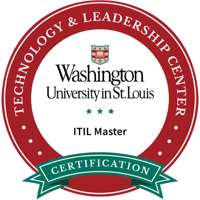ITIL Master Certificate

The ITIL Master Certification is an advanced program designed for IT professionals who wish to demonstrate their mastery of IT service management. This certification program is intended to equip learners with practical skills and knowledge necessary to excel in the IT industry.
At Washington University in St. Louis, we offer the ITIL Master Certification program, which requires learners to complete six required courses covering a range of topics related to IT service management. These courses are designed to provide learners with practical skills and knowledge that can be applied to real-world IT service management scenarios.
Upon completion of the six required courses, learners will earn the ITIL Master Certification from Washington University in St. Louis. This certification is highly regarded in the IT industry and can help learners demonstrate their expertise in IT service management.
Courses Required
1) ITIL 4 Foundation
ITIL 4 Foundation is an entry-level certification course that introduces the latest version of the ITIL framework. The course covers IT service management concepts and terminology, key principles and practices, and the ITIL service value system. Participants will gain an understanding of how to use the ITIL framework to enhance business outcomes and improve IT service management. Upon completion of the course, participants will be equipped with the knowledge and skills to sit for the ITIL 4 Foundation certification exam.
2) ITIL Specialist: Create, Deliver & Support
Our ITIL Specialist - Create, Deliver & Support course teaches IT professionals and practitioners how to create, deliver and support IT services using the ITIL 4 framework. This course covers best practices for service design and architecture, service level agreements, availability, capacity and continuity management, monitoring, reporting and event management, service request and problem management, release and deployment management, service configuration management and knowledge management. Upon completion of the course, participants will have the skills and knowledge needed to apply IT service management best practices in their own organizations.
3) ITIL Specialist: Drive Stakeholder Value
The ITIL Specialist: Drive Stakeholder Value course is designed to help IT professionals develop the skills and knowledge needed to create, deliver, and support customer-focused services. This course covers topics such as stakeholder management, communication, and customer journey mapping to help students learn how to create positive stakeholder experiences, improve customer satisfaction, and drive business value.
4) ITIL Specialist: High Velocity IT
The ITIL Specialist: High Velocity IT course is designed to provide IT professionals with the tools and knowledge needed to navigate the digital age. This course covers the latest trends in technology, including automation, cloud computing, and continuous delivery and how they relate to ITIL best practices. Participants will learn how to use these tools and techniques to improve the speed, quality and efficiency of their IT services. This course is ideal for those looking to improve their skills in IT service management and stay current with the latest industry trends.
5) ITIL Strategist: Direct, Plan & Improve
The ITIL Strategist: Direct, Plan & Improve course provides IT professionals with the knowledge and skills needed to drive organizational change and improve IT service delivery. This course focuses on the principles of organizational change management, risk management, and measurement and reporting. Participants will learn how to use ITIL best practices to direct and plan organizational change initiatives, as well as how to use data and metrics to drive continuous improvement. This course is ideal for IT professionals who are looking to improve their strategic planning and change management skills.
6) ITIL Leader: Digital & IT Strategy
The ITIL Specialist - Digital and IT Strategy course equips IT professionals with the knowledge and skills to develop and implement effective digital and IT strategies. Participants will learn how to align their organization's digital and IT initiatives with its overall business objectives, leverage emerging technologies, and respond to the changing demands of the market. The course covers topics such as digital disruption, enterprise architecture, business relationship management, and service management.